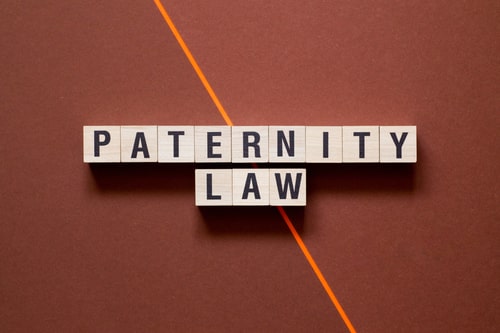Recent Blog Posts
How Do I Make an Illinois Divorce Easier for My Child?
 Divorce is stressful for the people involved, and any shared children may also be affected by the high emotions of your divorce. Ensuring your divorce moves smoothly can help make a divorce easy on your child, though you may also need to take the time to support your child to help them cope with the changes that your divorce brings. A knowledgeable Illinois divorce lawyer can help guide you through this process and advocate for you and your child’s rights during a divorce.
Divorce is stressful for the people involved, and any shared children may also be affected by the high emotions of your divorce. Ensuring your divorce moves smoothly can help make a divorce easy on your child, though you may also need to take the time to support your child to help them cope with the changes that your divorce brings. A knowledgeable Illinois divorce lawyer can help guide you through this process and advocate for you and your child’s rights during a divorce.
Create a Parenting Plan in Illinois that Works for Everybody
One of the most important things to do during your divorce if you have shared children is to create a parenting plan. The Illinois Marriage and Dissolution of Marriage Act outlines four different categories of responsibility that you and your co-parent will have to decide upon for your child. These categories include:
Can an Illinois Court Order a Paternity Test?
 Establishing paternity for a shared child can be a complicated process, and it may bring up many emotions between the mother and the potential father of the child. There are many reasons why an individual may want to verify paternity, and Illinois courts sometimes need to step in and order paternity tests. If you are questioning the paternity of your child or need help verifying the paternity of a shared child, you can benefit from the guidance of an experienced Illinois paternity lawyer.
Establishing paternity for a shared child can be a complicated process, and it may bring up many emotions between the mother and the potential father of the child. There are many reasons why an individual may want to verify paternity, and Illinois courts sometimes need to step in and order paternity tests. If you are questioning the paternity of your child or need help verifying the paternity of a shared child, you can benefit from the guidance of an experienced Illinois paternity lawyer.
Reasons to Establish Paternity
It may be necessary for anyone with a shared child to establish paternity as part of divorce proceedings, to establish rights when it comes to child support or custody, and to verify who is responsible for a child. A potential father and their child can benefit from the rights and protections given when parentage is established.
When Should I Consider Divorce Mediation?
 During a divorce, many couples find themselves with strong emotions and unable to reach agreements about important decisions. It can be difficult to navigate this process when one or both parties are constantly arguing and there does not seem to be a way to meet in the middle. This is where a divorce mediator comes in. A mediator is a neutral third party to help couples figure out important decisions. An Illinois divorce attorney who works as a mediator is just the person to help guide your divorce.
During a divorce, many couples find themselves with strong emotions and unable to reach agreements about important decisions. It can be difficult to navigate this process when one or both parties are constantly arguing and there does not seem to be a way to meet in the middle. This is where a divorce mediator comes in. A mediator is a neutral third party to help couples figure out important decisions. An Illinois divorce attorney who works as a mediator is just the person to help guide your divorce.
What Is a Divorce Mediator?
A divorce mediator is someone who, under the guidelines of the Illinois Uniform Mediation Act, is able to act as a third neutral party and help couples resolve their issues or arguments as they navigate a divorce. A mediator is there to diffuse any extreme arguments and direct the couple toward resolving their disagreements with civility and fairness.
Do Civil Unions Offer Any Benefits in Illinois?
 Illinois was the first state to recognize civil unions, and while civil unions have primarily been thought of as a way for same-sex couples to be legally protected, they are actually an option for any couple. Since the legalization of same-sex marriage in Illinois, civil unions are somewhat less popular, but they do offer some state-level benefits. However, civil unions can also be complex to dissolve, much like a marriage.
Illinois was the first state to recognize civil unions, and while civil unions have primarily been thought of as a way for same-sex couples to be legally protected, they are actually an option for any couple. Since the legalization of same-sex marriage in Illinois, civil unions are somewhat less popular, but they do offer some state-level benefits. However, civil unions can also be complex to dissolve, much like a marriage.
An experienced Illinois civil union attorney can help you understand civil unions in more detail.
Civil Unions Versus Marriage
The Illinois Religious Freedom Protection and Civil Union Act gives details about civil unions, including details about what is protected at a state level by a civil union. It is important to note that a civil union is not the same as marriage, as civil unions only protect the legal rights of couples in the state of Illinois.
Will I Have to Support My Spouse After an Illinois Divorce?
 Spousal support, also referred to as alimony, is a type of payment made to one spouse by the other after a divorce. There are a number of situations where spousal support may be necessary, and it is important to figure out if this will be a factor in your divorce. A seasoned Illinois divorce attorney can help you explore your options when it comes to determining spousal support payments in your divorce.
Spousal support, also referred to as alimony, is a type of payment made to one spouse by the other after a divorce. There are a number of situations where spousal support may be necessary, and it is important to figure out if this will be a factor in your divorce. A seasoned Illinois divorce attorney can help you explore your options when it comes to determining spousal support payments in your divorce.
When Is Spousal Support Awarded?
Details regarding maintenance for spouses in a divorce are outlined by the Illinois Marriage and Dissolution of Marriage Act. Under this act, there are a few different situations where spousal support may be necessary for one party after a divorce is finalized.
Common situations where spousal support may be needed include:
What Legal Help Can I Get in a Domestic Violence Case?
 Domestic violence during a divorce, child custody dispute, or other family law matters is a major risk for the victim and any children. It is possible to receive legal help to protect yourself and your loved ones during this time, but you may not know which options are available to you. An experienced Illinois domestic violence attorney can help you file the proper protections and paperwork in court to keep yourself and your children safe from domestic violence.
Domestic violence during a divorce, child custody dispute, or other family law matters is a major risk for the victim and any children. It is possible to receive legal help to protect yourself and your loved ones during this time, but you may not know which options are available to you. An experienced Illinois domestic violence attorney can help you file the proper protections and paperwork in court to keep yourself and your children safe from domestic violence.
What Should I Do if Domestic Violence Is a Risk?
Domestic violence is any abusive behavior against one partner in an intimate relationship. Domestic violence is not just physical violence but any emotional, economic, or verbal abuse. It can be hard to recognize the signs of domestic violence from outside of a relationship, and some individuals may struggle with leaving an abusive relationship for fear of their safety or the safety of their children and pets.
When Is a Prenuptial Agreement a Good Idea?
 Prenuptial agreements are sometimes a controversial topic, but these agreements help you and your spouse decide important things before marriage. A prenuptial agreement may be utilized in the case of a divorce, and they do have some critical pros and cons to pay attention to.
Prenuptial agreements are sometimes a controversial topic, but these agreements help you and your spouse decide important things before marriage. A prenuptial agreement may be utilized in the case of a divorce, and they do have some critical pros and cons to pay attention to.
An experienced Illinois divorce attorney can help you understand your prenuptial agreement in the event that you and your spouse are seeking a divorce.
What Is Included in a Prenuptial Agreement?
Prenuptial agreements are agreements that spouses make before marriage about certain assets, businesses, debts, and property. Prenuptial agreements, also known as premarital agreements under the Illinois Uniform Premarital Agreement Act, have historically been used to protect wealth. Still, they are becoming more popular for many couples wishing to agree upon finances, assets, and marital responsibilities.
What is a No-Fault Divorce?
 Divorce is a complex process, and all of the parties involved in a divorce may find it stressful. A no-fault divorce is one that is generally uncontested, and a no-fault divorce in Illinois must meet a few qualifications. If you seek a divorce from your spouse, securing experienced representation from an Illinois divorce lawyer is essential to ensure your divorce is decided fairly.
Divorce is a complex process, and all of the parties involved in a divorce may find it stressful. A no-fault divorce is one that is generally uncontested, and a no-fault divorce in Illinois must meet a few qualifications. If you seek a divorce from your spouse, securing experienced representation from an Illinois divorce lawyer is essential to ensure your divorce is decided fairly.
Do I Need to Prove Anything for My No-Fault Divorce?
Before Illinois became a ‘no-fault divorce’ state in 2016, with additions to the Illinois Marriage and Dissolution of Marriage Act, spouses seeking a divorce would need to prove that the other party was ‘at fault’ for the divorce through an act such as adultery, abandonment, or substance abuse.
What Makes a Child Custody Case Difficult?
 Divorce can be a messy process, and there are many factors to navigate, including child support, spousal support, and child custody or parenting agreements. A child custody case can be made more difficult when one parent refuses to reach an agreement with the other or one parent accuses the other of being unfit. An Illinois child custody lawyer can help you navigate child custody and reach a parenting agreement that keeps your child’s best interests in mind.
Divorce can be a messy process, and there are many factors to navigate, including child support, spousal support, and child custody or parenting agreements. A child custody case can be made more difficult when one parent refuses to reach an agreement with the other or one parent accuses the other of being unfit. An Illinois child custody lawyer can help you navigate child custody and reach a parenting agreement that keeps your child’s best interests in mind.
Understanding Illinois Child Custody Law
Child custody agreements fall under the category of family law, and the Illinois Marriage and Dissolution of Marriage Act governs most of the matters you will deal with when proceeding through a divorce and settling on a child custody agreement.
How Do I Obtain an Illinois Order of Protection?
 For victims of domestic violence or abuse, an order of protection is a step towards safety and provides them the security needed to exit a dangerous situation. An Illinois domestic violence lawyer can help you file for a temporary order of protection to ensure your immediate safety before guiding you through the process for a more long-term solution.
For victims of domestic violence or abuse, an order of protection is a step towards safety and provides them the security needed to exit a dangerous situation. An Illinois domestic violence lawyer can help you file for a temporary order of protection to ensure your immediate safety before guiding you through the process for a more long-term solution.
What Is an Order of Protection?
These orders are court documents that are intended to keep an individual safe from an abuser or another individual who presents a safety risk.
In Illinois, there are four different types of orders of protection. You must file for the correct order for your situation:
- An order of protection is used for a situation where the victim has a relationship with the abuser, such as a spouse or family member.

 630-584-5550
630-584-5550







 630-584-5550
630-584-5550